She Loves You (Yeah, Yeah, Yeah) Read online
Page 2
Clearly I had been daydreaming for quite a while, because when I looked away from the window Mrs. Peabody was pointing to a map of ancient Rome that hung from the blackboard and telling us in a very excited voice how by June we would be able to name all of the Roman emperors and recite Marc Antony’s eulogy for Julius Caesar. I tried to catch Michelle’s eye again, but she was staring at that map as if it held the secret to something. Kenny Prescott, the boy with the best swoop of bangs falling into his eyes and also the longest eyelashes, was looking at me and not in a good way, so I stared at the map, too, sounding out the names in my head. Macedonia. Cappadocia. Mesopotamia.
“So,” Mrs. Peabody said, “let’s see who’s coming to ancient Rome with me!”
She picked up the attendance book and started at the top.
“Mary Beth Argo?”
“Here,” Mary Beth said in her timid little voice. She still played with dolls, in particular Little Kiddles, the tiny dolls with long hair that came in plastic perfume bottles or fancy egg-shaped containers. Mary Beth kept them in her desk, and when she got bored, which was almost always, she took them out and combed their hair with her fingers.
“Nora Goldsmith?”
“Here,” Nora said. Her eyes were all red and puffy, like she’d been crying.
But Mrs. Peabody didn’t seem to notice, she just kept calling out our names, her companions into ancient Rome. I wondered if Paul McCartney had studied ancient Rome. I knew his junior high in Liverpool was called the Joseph Williams Junior School and he went there after the Stockton Wood Road Primary School in Liverpool. I knew that Paul was one of only four kids out of ninety who passed the 11-plus exam and gained admission to the Liverpool Institute, an all-boys grammar school, which is what they call high school in England, with an excellent academic reputation. I knew he got As in art and English and geography. Basically, I knew everything about Paul McCartney.
Mrs. Peabody’s voice interrupted my thinking about Paul McCartney. “Gertrude Mixer,” she said.
I froze.
“Gertrude Mixer,” she said again, louder this time.
Someone giggled.
A boy from somewhere behind me said, “Ger-trude,” like he was calling a cat.
Michelle tilted her blond head in my direction and looked at me like she was seeing me for the very first time. I loved Michelle because she was my best friend, but I had to admit that ever since the Beatles song “Michelle” came out last year she could be a little full of herself. Sometimes she even threw French words in normal conversation, just because the song did: Sont les mots qui vont très bien ensemble . . . Sometimes when I played Rubber Soul, I skipped the song “Michelle” and went straight to “It’s Only Love.” For example, like last night when Michelle didn’t call me.
“Gertrude!” Mrs. Peabody practically shouted. Her eyes scanned the room, searching for the owner of that horrible, old lady, old-fashioned, ugly name.
I wanted to disappear. But that was not an option. Every single kid was looking straight at me, waiting.
Slowly, I raised my hand.
“Here,” I squeaked.
Until that moment, I had been Trudy Mixer, straight-A student and president of the Robert E. Quinn Junior High Beatles Fan Club. Suddenly, I realized, I was now Gertrude. Ger-trude. Suddenly, I realized with, as Dad says when he realizes something important, “stunning clarity,” my life as I knew it was over.
I liked to get to the Beatles Fan Club meetings early so I could write a new Fab Four Fun Fact on the blackboard and organize the mimeographed quizzes and the fan letter envelopes. We met every Wednesday after school in Mr. Bing’s science lab, a room that smelled like formaldehyde and BO—formaldehyde because that’s where the frogs got dissected, and BO because it was a ninth-grade classroom and ninth-grade boys had BO.
On this Wednesday, the very day that Mrs. Peabody had turned me from Trudy into Gertrude, Mr. Bing had already left for the day. For this, I was relieved. Not only did it give me time to get organized, but it also allowed me to briefly go over all the ways my day had gone wrong ever since social studies. For one thing, Michelle had sat with Becky Thorpe and Kimberly Franklin during lunch. Instead of with me. I’d hovered by their table a moment, and even though Becky had smiled at me—with pity—I thought, Michelle had basically ignored me. She was drinking her eggnog-flavored Carnation Instant Breakfast from the little cup that came with her thermos, in an effort to lose ten pounds and be as skinny as the model Twiggy, The Face of 1966.
While I stood there being awkward, Michelle told Becky and Kimberly that she was going to get her hair cut as short as Twiggy’s, and they both gasped. No one at Quinn had short hair. We all wore our hair exactly the same way—long, straight, and parted down the middle—except for poor Angela Silva, who was cursed with curly hair. Even when she ironed it, in no time her curls sprung right back.
“You’re cutting your hair?” I blurted. “Since when?”
Michelle glanced up at me, barely, then just kept on talking like I wasn’t standing there holding a tray with a sloppy joe and an apple on it.
“Michelle?” I said, trying to make my voice sound strong and confident. “When did you decide that?”
Michelle sighed. “I don’t know, Trudy. Over break.”
The one time we had seen each other over April break, Michelle had most definitely not mentioned cutting her hair as short as Twiggy’s.
Becky said, “Do you want to sit with us?”
I didn’t. I wanted Michelle to get up and for the two of us to find seats together somewhere. But that was obviously not going to happen. So I said Sure and sat down across from Michelle and ate my sloppy joe while they all talked about how The Sound of Music was the best movie they’d ever seen. Apparently, they had all gone to see it together over break.
“Didn’t you love the part where Maria makes them the matching outfits out of curtains?” Becky asked me.
I had not yet seen The Sound of Music, so I had no idea who Maria was or who she made outfits of curtains for.
“Yeah,” I said. “I love that part.”
* * *
* * *
Also, for the rest of that day, whenever I changed classes the boys whispered, Ger-trude, all creepy-like as I walked by.
Then last period, French class, Mr. Lamereaux assigned us French names for when we had practice conversations, except of course Michelle, whose name was already French. Every girl had a crush on Mr. Lamereaux: He drove a red convertible MG and he looked like Herman from the group Herman’s Hermits.
Mary Beth’s French name was Bijoux, which meant “little jewel,” and Becky got Babette and Kimberly got Camille and Nora—still with her red eyes—got Desirée and Jessica, the least popular girl in the entire grade if not the entire school, got the beautiful name Mirabelle.
“Ah, Mademoiselle Mixer,” Mr. Lamereaux said to me, “your French name is . . .”
I was so excited I couldn’t sit still. Oceane? Emanuelle? Delphine?
A slow smile crept across Mr. Lamereaux’s face.
“Why, like Michelle my belle, you already have a French name, too!”
I swallowed hard. “I do?”
For the second time that day, a teacher said that old- fashioned, old lady, ugly name right out loud. In front of everyone. It didn’t help that Mr. Lamereaux pronounced the G like a J, the way they do in French.
“Gertrude,” he said.
* * *
* * *
Clutching the still warm mimeos to my chest in the science lab, I could practically still hear the class laughing. Jer-trude! I pressed the paper to my nose, inhaling the delicious inky smell.
Well, I told myself, in six minutes twenty-three Beatles Fan Club members are going to walk in this room and you, Trudy Mixer, will once again be in charge, on top of the world. I put the quizzes on Mr. Bing’s desk, next to his weird collection of trol
l dolls. Then I picked up a fat piece of purple chalk (purple was George’s favorite color, one of the quiz questions today) and wrote the Fab Four Fun Fact of the Day on the board:
John Lennon’s middle name, Winston, was given to him as an act of wartime patriotism to honor then prime minister Winston Churchill.
I stepped back and admired my handwriting, and the fun fact itself.
The door opened and in walked Peter Haywood, the lone boy in the fan club.
“Hi, Trudy,” he said, and I could have hugged him for not calling me Gertrude.
“Hi,” I said.
“Do you know what onomatopoeia is?” he asked me. His cheeks were bright red when he asked me, and his cowlick trembled a little.
“Yes,” I said, even though I didn’t. I just hated not knowing something.
Peter grinned and turned even redder. Candy apples came to mind.
“What’s your favorite example of onomatopoeia?” he asked me.
Peter’s eyes are a color called hazel, which is kind of golden, which is strange for eyes. This close I could see that there was some green in them, too. And maybe a little brown ring around the pupil.
“It’s a combination of Rayleigh scattering and melanin,” Peter said.
At first I thought he was explaining this onomato thing, but then he said, “Rayleigh scattering is what makes the sky look blue, and melanin is the pigment that makes brown eyes brown.”
Then I knew he was explaining hazel eyes.
“Huh,” I said, because what else could I say to such a weird thing? Besides, I didn’t like how he knew I was practically gazing into his eyes.
“Most people with hazel eyes are water signs,” Peter said.
“Are you?”
“I’m a Cancer. July seventh.”
“That’s Ringo’s birthday!” I said.
“I know,” he said. “I’m in the fan club, remember?”
The fan club.
I frowned and looked at the clock. 3:21. Everyone except Peter was six minutes late.
“Chug, chug, chug. Puff, puff, puff. Ding-dong, ding-dong. The little train rumbled over the tracks.”
“What?” I said, not trying to hide how annoyed I was. What was he talking about? And where was everyone?
“The Little Engine That Could!” Peter said, as if that explained anything.
The door opened again and weird Jessica Mancini skulked in, followed by Nora Goldsmith.
Peter didn’t seem to notice. “That’s my favorite example of onomatopoeia!” he said proudly.
Nora smiled, maybe for the first time that day.
“Well, my heart went boom, when I crossed that room—” she sang from “I Saw Her Standing There,” one of my all-time favorite Beatles songs, even though it was the flip side of “I Want to Hold Your Hand.” I considered telling these three this Fab Four Fact, but Peter was already talking, telling Nora what a good example of onomatopoeia that was.
Apparently everyone knew about this onomato thing. Except me. Which made me very cranky. Also: Um, where was everyone?
“I guess we’ll wait a few more minutes,” I said, trying to sound like someone in charge.
“Michelle’s not coming,” Jessica said. “She went to Future Cheerleaders.”
“Michelle?” I repeated, just in case my hearing had suddenly gone bad. “Future Cheerleaders?”
“With Becky and Kimberly,” Jessica added.
Now my heart was going boom, but not in a good way like in the song. So that’s what onomato was—words that sounded like a sound. Boom.
At 3:30 Nora said, “If we don’t start I’m going to miss the late bus.”
“Okay,” I said, even though my brain was saying FutureCheerleadersFutureCheerleaders over and over.
I handed out the quizzes, printed in smudged purple mimeograph ink. From somewhere in the distance I heard voices rise, calling, “Give me a Q!”
Jessica rolled her eyes. “Cheerleaders,” she said under her breath.
By the time everyone finished the quiz and I read off the right answers, it was almost four o’clock and we hadn’t even written our fan letter begging the Beatles to come to Boston for another concert.
“We could write them when we get home,” Peter offered.
“No we can’t,” I said. “It’s a club activity.”
The twenty-three envelopes, already stamped and addressed, seemed to mock me. Twenty-three fan club letters might help to persuade the Beatles to give a concert in Boston. But four letters? Four letters couldn’t convince anyone to do anything.
Nora was buttoning her jacket. “The bus,” she said apologetically.
And just like that, the members of the Robert E. Quinn Junior High Beatles Fan Club all made their way to the door.
Peter turned. “Bye,” he said.
I didn’t answer. I couldn’t. My Beatles Fan Club had dwindled to almost nothing.
“What’s that spell?” the cheerleaders yelled. “Quinn!”
I could almost swear I heard Michelle yelling louder than anyone.
CHAPTER THREE
All My Loving
On February 9, 1964, the Beatles appeared on The Ed Sullivan Show. The next day, February 10, I formed the first Beatles Fan Club in the entire state of Rhode Island. I even got an official certificate from the Beatles Fan Club Headquarters in Liverpool stating that mine was the original Rhode Island chapter. For the rest of that year, we met every week, playing Beatles records and making big buttons with our favorite Beatle’s face on them. Most kids liked John or Paul. Michelle had the biggest crush on John, even though under his name on The Ed Sullivan Show it said: SORRY GIRLS, HE’S MARRIED. “He’s smart and sarcastic and he’s a poet,” she said. “Besides, his wife is so cool.” Nora chose Ringo, claiming he was the best drummer who’d ever lived. Also, she said he had a twinkle in his eye. No one wanted George, so I made Jessica wear a George pin because she was the kind of person who George would like: quiet and kind of weird. Say quirky, not weird, my mother always told me. But Jessica wasn’t quirky. She was weird.
Me, I love Paul. Last year when Paul sang “Yesterday” alone on The Ed Sullivan Show, I almost fainted. I got all light-headed and tingly and I couldn’t move, not even my pinky. It was like he hypnotized me or something. This was one of my favorite Fab Four Fun Facts:
Did you know that one morning Paul woke up with a lovely melody in his head and went straight to the piano to play it? But the only lyrics he could think of were “Scrambled eggs, oh my baby how I love your legs . . .” That song became the hit “Yesterday”!!!
That was the first Fab Four Fun Fact, but honestly, I could have added so much more. Like how Paul was living in London, on Wimpole Street, with his girlfriend Jane Asher’s family. Or how the lyrics finally came to him when he and Jane Asher were driving to Portugal. Or that “Yesterday” was the first song Paul wrote without John, even though the record says Lennon-McCartney. The one time I saw her over April break, Michelle told me that my love of the Beatles was getting out of hand.
“I mean really, Trudy,” she said, “you know Jane Asher’s address? Don’t you think that’s kind of, I don’t know, crazy?”
“It’s in all the fan magazines,” I said. “Everybody knows it.”
I didn’t tell her that I also knew Jane Asher’s birthday and her parents’ names and a million other things. I didn’t want my best friend to think I was crazy. Besides, didn’t she love all kinds of facts, too (152 breeds of dogs, all the countries below the equator, the names of every First Lady from Martha to Lady Bird)? Also, I just loved the Beatles. And everything about the Beatles. Especially Paul. Which is why on the way home from school after the lowest-attended, worst meeting ever of the Beatles Fan Club, I decided I had to do something big. Something extraordinary. Something that would return me to my rightful place in the suddenly t
errible, confusing world of the sixth grade.
I had to do something. But what?
* * *
* * *
“How was school?” Mom asked me that night at dinner, which was meat loaf, my least favorite thing in the world.
I poured practically a whole bottle of ketchup on it to hide the meat loaf taste.
“Honestly, Trudy,” Mom said, shaking her head.
Dad didn’t notice. He was too busy reading the Wall Street Journal, his face hidden behind it. Lately, he read the newspaper every night during dinner because he claimed it was beneficial to always do more than one thing at a time. For example, when he watched TV he also ate celery because all that chewing actually burned calories, and when he drove he recited things like the Gettysburg Address or the Bill of Rights to keep his mind alert. But even if he wasn’t reading the newspaper or reciting the Gettysburg Address, Dad did not pay very much attention to me. To anyone really. Except his job. Mostly, he looked at me like I was someone vaguely familiar.
Mom always reminded me when I complained about Dad ignoring me that Dad has a big important job that kept him preoccupied, even when he was home. He has one of those jobs without a real name and that’s too complicated to explain. Every now and then he would glance in our direction and say something from the newspaper that we didn’t understand, like: Do you think it would be a good idea for music to play in elevators and grocery stores?
That was the question he asked over meat loaf that night.
“Charles”—Mom laughed—“why would someone play music in an elevator?”
“What kind of music?” I asked.
“Soft music. Nonintrusive music. Music you don’t notice.”
Mom laughed even harder. “If you don’t notice it, why do you need it?”
But he was back behind the paper again, lost to us.
Mom and I chewed our peas. She made a little hill out of her mashed potatoes. Dad turned the page.
“I would like Beatles music to play in elevators,” I said. “And grocery stores. And maybe even just in the air so that when I’m walking to school I could hear ‘I Saw Her Standing There.’”

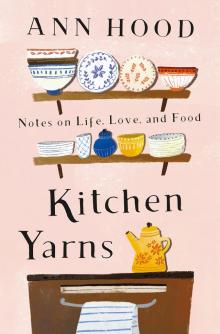 Kitchen Yarns
Kitchen Yarns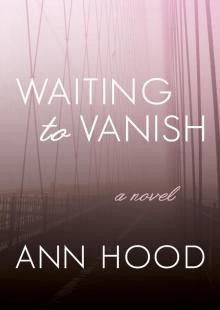 Waiting to Vanish
Waiting to Vanish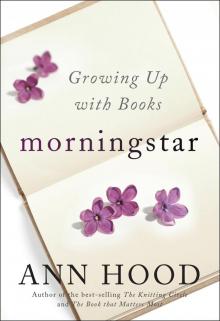 Morningstar
Morningstar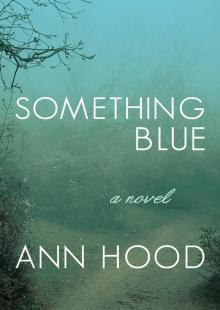 Something Blue
Something Blue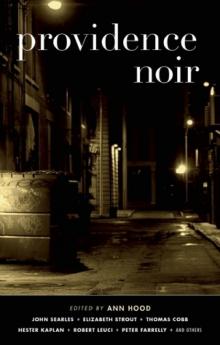 Providence Noir
Providence Noir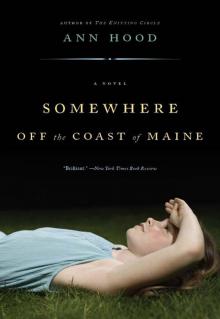 Somewhere Off the Coast of Maine
Somewhere Off the Coast of Maine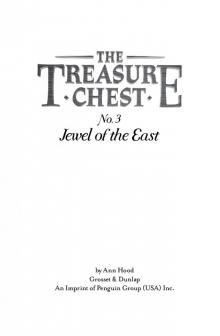 Jewel of the East
Jewel of the East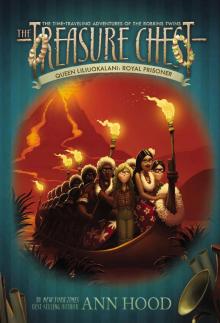 Queen Liliuokalani: Royal Prisoner
Queen Liliuokalani: Royal Prisoner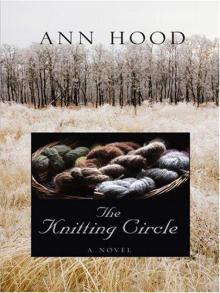 The Knitting Circle
The Knitting Circle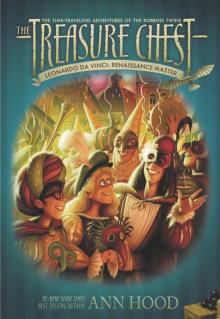 Leonardo da Vinci: Renaissance Master
Leonardo da Vinci: Renaissance Master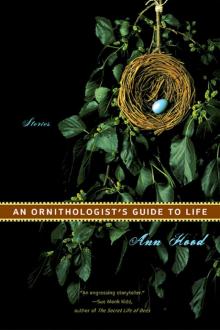 An Ornithologist's Guide to Life
An Ornithologist's Guide to Life The Red Thread
The Red Thread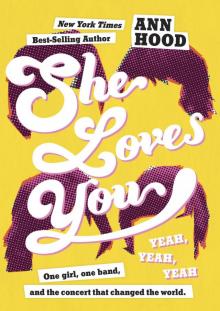 She Loves You (Yeah, Yeah, Yeah)
She Loves You (Yeah, Yeah, Yeah)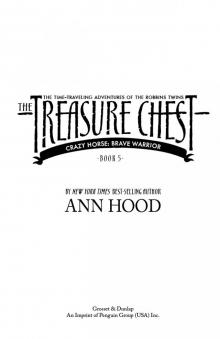 Brave Warrior
Brave Warrior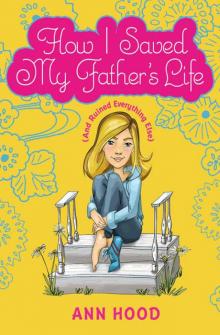 How I Saved My Father's Life (and Ruined Everything Else)
How I Saved My Father's Life (and Ruined Everything Else)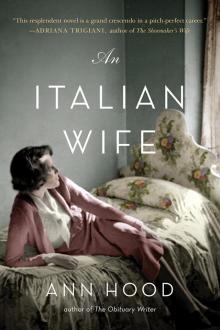 An Italian Wife
An Italian Wife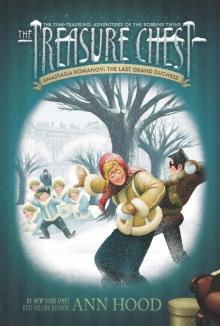 Anastasia Romanov: The Last Grand Duchess #10
Anastasia Romanov: The Last Grand Duchess #10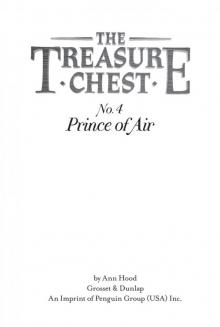 Prince of Air
Prince of Air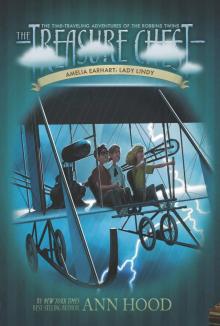 Amelia Earhart: Lady Lindy
Amelia Earhart: Lady Lindy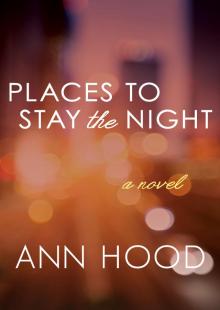 Places to Stay the Night
Places to Stay the Night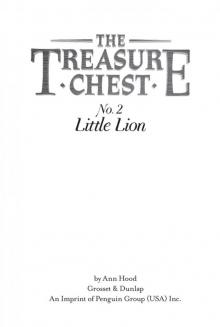 Little Lion
Little Lion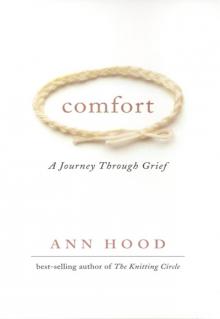 Comfort
Comfort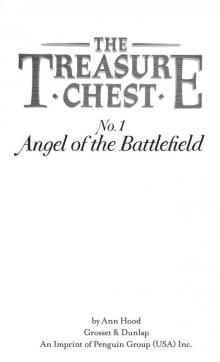 Angel of the Battlefield
Angel of the Battlefield